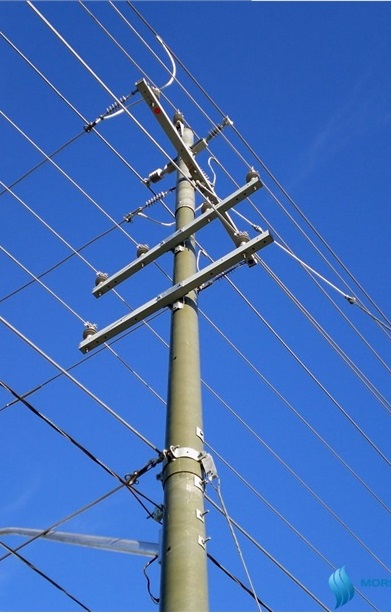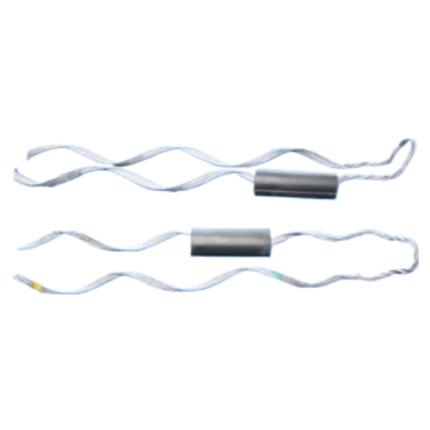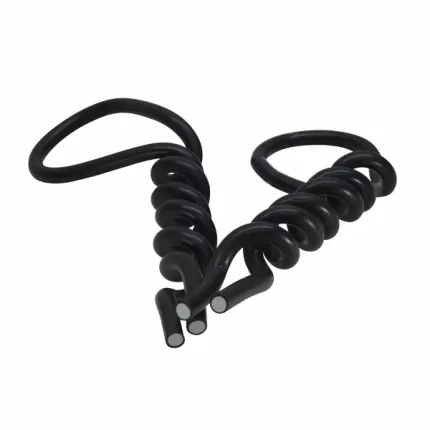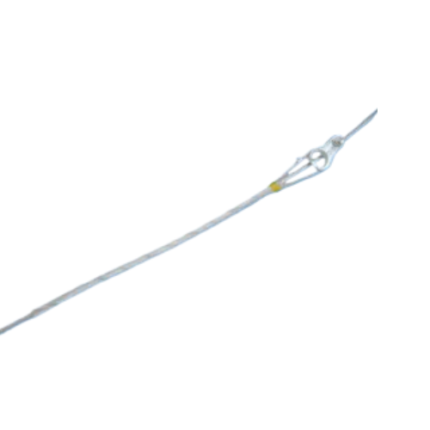In the early days the overhead power cable mainly relied on wooden pole as the main material. As timber resources got scarce and difficult to obtain due to the protection by each country, concrete pole became an alternative. However, concrete pole is too heavy, not convenient to install and easy to be corroded by sandy wind, American and some European advanced countries pioneered using the FRP power pole as the replacement in attribute to its excellent properties of lightweight, good physical properties and anti-corrosion. Nowadays FRP power pole has been adopted as the choice of power transmission lines in most of the modern countries.
Description
Description.
FRP Poles using newly invented technology to produce high quality FRP Pole with competitiveness. Using un-saturable polyester resin as
basic material and unidirectional fiberglass woven fabrics as skeleton, the FRP pole is taken shape by centrifugal process. It could be used
as luminary pole, utility pole, flag pole and other applications.
Advantages of FRP Pole.
1/ Non-conductive and excellent insulation property.
2/ Safe in accident cases.
3/ Anti-corrosion and rust free – especially suitable to be used under extreme weather condition including high humidity coastal area, desert,
oil field, high altitude and industrial area with acid and alkali condition.
4/ Light weight, around 1/3 weight of the steel lighting pole. Easy installation and save on labor, time and equipment.
5/ Maintenance free, long-life span.
6/ Aesthetics, smooth surface with good finishing. Also can be color matched to suit any environment.
7/ Excellent Mechanical Properties.
| Material |
Tensile Strength (103 PSI) |
Flexural Strength (103 PSI) |
Compression Strength (103 PSI) |
| Composite/FRP | 80 | 100 | 45 |
| Die Cast Aluminum | 48 | 48 | 48 |
| Low Carbon Steel | 48 | 48 | 48 |
| Stainless Steel | 80 | 80 | 80 |
FRP with 80% fiber glass content using filament winding (Source: Reinforced Plastics Handbook/ second Edition by John Murphy)
Pole Types Comparision.
FRP Poles have distinctive advantages compared with the traditional material ones, such as steel pole, aluminum pole, concrete pole and
wood pole.
| FRP Poles | Galvanized Steel Poles | Aluminum Poles | Concrete Poles | |
| Light Weight | G | B | A | B |
| Direct Burial | G | B | B | A |
| Easy to Maintain | G | B | A | A |
| Color Stability | G | B | B | B |
| Easy to Install | G | B | B | B |
| Non-Conductive | G | B | B | G |
| Corrosion Resistance | G | B | B | A |
| Long Life Span | G | A | G | A |
G. Good A. Average B. Bad
FRP Pole Standard.
We follow BS 1990-1 specification, withstand max wind speed of 40m/sec.
1/ USA Standard: ANSI C136.20-1990; ASTM D4923-01, Class 1, National Pole Standard.
2/ EU Standard: EN40.
3/ China Standard: CNS-11652.
Bending Testing.
Applied loading is calculated based on wind speed of 60m/sec according to ANSI.
| Pole Height (m) | Deflection Design | Max Deflection | Loading (Kg) | Note |
| 4.5 | 10% | 40 cm | 54 | |
| 5.5 | 10% | 50 cm | 66 | |
| 6.5 | 10% | 60 cm | 74 | |
| 7.5 | 10% | 70 cm | 86 | |
| 8.5 | 10% | 80 cm | 94 | |
| 9.5 | 10% | 90 cm | 101 | |
| 10.5 | 10% | 100 cm | 112 | |
| 11.5 | 10% | 110 cm | 165 | |
| 12.5 | 10% | 120 cm | 179 |
FRP Pole Specification & Design.
Our company designs and produces the FRP pole according to ANSI CI 136.20:1990. The exterior surface should be smooth and aesthetic, shall be free of crack, air bubbles, damage or any exposed surface fiber. The surface of the pole should be finished with an ultraviolet-resistant uniform coating and has exceptional weather-resistance performance. The interior surface should be free of stratification, blocking and white stain that is the result of the fiber not being thoroughly wetted by the resin. Based on wind speed of 60m/sec equivalent to Beaufort Scale Force 17, the pole top deflection induced by the wind acting on the pole shall not exceed 10% of the pole length.
For FRP Lighting pole divides into direct- burial pole and anchor-base pole, the direct-burial pole includes shaft, single arm, double arm. Anchor-base pole include: FRP base shaft, FRP base single arm, FRP base double arm, steel base shaft, steel base single arm and steel base double arm.
Our company has two tapers for the lighting pole, one type is 1/75, the minimum diameter is 80mm, the maximum diameter is 260mm and the maximum length: 12000mm; the other type is 1/55, the minimum diameter is 80mm, the maximum diameter is 298mm and the maximum length is12000mm.
The cover of wire hole must be waterproof, the metal fittings to be used for interior fastening must be hot galvanized or stainless steel. The height of the
FRP Lighting Pole should have a tolerance of +30mm, -0mm and the thickness is +3mm, -0mm. The surface hardness of the pole should be over 35.
The bent strength of the pole should be over 320Mpa. According to AASHTO.LTS.2:198, the pole shall not exceed a maximum deflection of 10% of the pole length above the ground line when subject to the maximum simulated wind loading and shall not have more than 1% permanent deflection.
+ Specification of single pole.
|
Nominal height (H) |
Depth of planting (P) |
Height above ground (H1) |
Top dia of pole (D1) |
Bottom dia of pole (D2) |
Ultimate load at pole top (Horizontal) (W) |
Load/mm of deflection at point of load |
Deflection under ultimate load (D) | Minimum weight |
Minimum thickness |
|
M |
M | M | mm | mm | KN | N | mm | Kg±10% |
mm±1 |
|
6 7 8 |
1.2 1.2 1.5 |
4.8
5.8 6.8 |
150
150 150 |
236
248 263 |
2.39
2.31 2.40 |
9.3
6.0 4.8 |
472
718 917 |
38.4
46.8 55.8 |
4.0 4.0 4.0 |
|
8.5 9.0 9.5 |
1.5
1.5 1.5 |
7
7.5 8 |
150
150 150 |
270
277 284 |
2.81
2.46 2.52 |
4.5
3.6 3.1 |
1069
1239 1458 |
60.5
65.3 70.2 |
4.0 4.0 4.0 |
|
10 10.5 11 |
1.5
1.5 1.8 |
8.5
9 9.2 |
150
150 150 |
291
298 305 |
2.23
2.31 2.40 |
2.6
2.3 2.3 |
1627
1874 1913 |
71.6
76.6 81.7 |
4.0
4.0 4.0 |
| 12 | 1.8 | 10.2 | 150 | 320 | 2.26 | 1.7 | 2139 | 105 |
4.0 |





